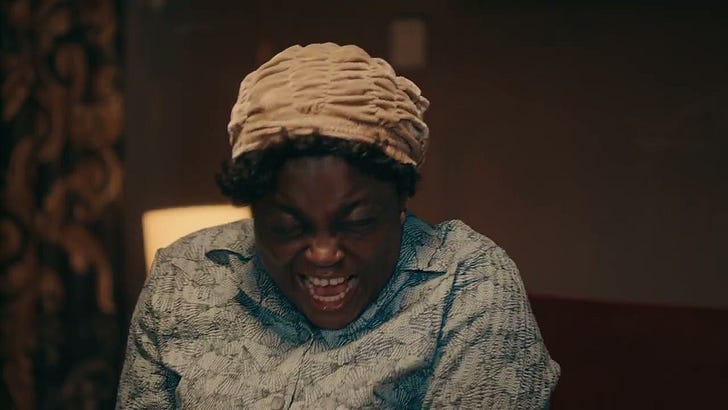Retro Nolly: "Jenifa" is a Nollywood Classic That Celebrates Authenticity
Jenifa showed Funke Akindele mastery social commentary via comical characters
Muyideen S. Ayinde’s Jenifa started humbly as a two-part film and within four years morphed into a sprawling well-beloved franchise and a successful TV series, Jenifa’s Diary. Funke Akindele’s portrayal of the eponymous lead character, Jenifa, a village girl navigating city life, has captivated, and still captivating, audiences across Africa and beyond. With Akindele's understanding of the character and skill brought to playing Jenifa, it wasn't surprising seeing her win the Best Actress in a Leading Role category at the Africa Movie Academy Awards (AMAA) in 2009. Since then, the film and Akindele haven't left public attention. There is often renewed enthusiasm to cheer the actress and watch the franchise — which she has reupped again with Everybody Loves Jenifa, a spinoff coming this December!
Jenifa follows Suliat, a village girl who finds herself in a school environment that constantly scorns her distinct accent and fashion game. Suliat, before being compelled to change her name to Jennifer upon moving from Aiyetoro to Lagos for studies, arrives in the city with bad grammar and an awkward fashion sense, which immediately announces her among her more cosmopolitan peers. Wanting to retain her spot as the happening babe, a position she enjoyed without competition in Aiyetoro, Suliat still move with confidence and zest.
Arriving at school, she meets Amope (Ronke Odunsanya), her childhood friend who is now Becky. Becky has new friends: Tracy (Mosunmola Filani) and Franca (Iyabo Ojo). Like Becky, Tracy and Franca have suppressed their real identities by changing their names so they belong to the cool gang — a familiar pressure to conform that folks from humble backgrounds often suffer when they arrive at university. Becky's friends were initially wary of Suliat’s presence in their midst due to her colourful fashion game, but eventually warmed up to her. From here the film explores the nocturnal lifestyle of the four girls — their flings with numerous men and interest in clubbing; Suliat’s confusion about the girls’ change of name and identity and her eventual transition from a village girl (Suliat) to a Lagos babe (Jenifa).
Written by Muhydeen Sasiliu, Sodiq Adebayo, Sharafadeen Olabode and Akindele, Jenifa recalls fragments of Zeb Ejiro's Domitila. In both films, we watch underprivileged young ladies, burdened with numerous financial responsibilities, turn towards sex work to get income. While both films appear to be identical twins, there are minute differences. Domitila, which focuses on its lead character story, extends its attention towards the complexities and trauma involved in being a sex worker. In Jenifa, the four friends aren't active sex workers but students, and the film sways towards observing how female university students, from indigent backgrounds, rely on transactional relationships to get by.
Although the film doesn't dwell or imply on the similarities amongst the four friends beyond their being passive sex workers. On close inspection, their bond reveals itself to the keen eyes. Tracy is an orphan and the sole provider for her two siblings. The film offers meagre information about Izoduwa’s family, but it is clear that she’s from a struggling family (why else will she be struggling with gaining admission if she is closer to wealth?) Becky, years before gaining admission, relied on Suliat’s philanthropic deeds to pay for an examination. And Suliat’s parents constantly ration call time between each other whilst complaining of being exploited by the call centre agent after being charged.
The friends are united in their familiarity with hardship and their universal desire to escape it. Their change of identity shows an outward dissociation with their indigent origin and an attempt to belong closer to wealth, even if only by appearance. Subsuming their local names for Western and cool names points towards wanting to fit into the aesthetic of happening Lagos babe. By wearing a pseudo-American accent and obsessively copying fashion styles they consider superior, the girls vicariously distance themselves from their background, but it goes further: the unsolicited and condemning stares and commentary on Jenifa’s outfit points to a deep-rooted hate and discomfort with who they are and where they are from. And the film uses Suliat, with her awkward fashion sense and laissez-faire attitude, to celebrate authenticity in a world that continuously maligns it while reinforcing the failings of Tracy, Becky and Franca's fake life.
A Tribe Called Judah: Funke Akindele Finally Wins The Box Office With Excellence
A few minutes into A Tribe of Judah, the crowd starts laughing. The laughter which starts in pockets of the cinema hall and soon fills the theatre begins when Funke Akindele’s character Jedidah Judah blessing pictures of her kids with holy water and continues as she tears into a sachet of alcohol and makes that wretched face we all make when we gulp str…
Though a ridiculously hilarious character, Suliat’s role passes social commentary on the unfair pressure placed on underprivileged people in a society obsessed with appearance. And this sense of passing subtle commentary through comical characters is a constant in Akindele’s productions. From Jenifa to She Must Be Obeyed to A Tribe Called Judah, her most recent production, Akindele has constantly used humour to highlight complexities of being poor in a society like ours. And while the flaws of her stories are apparent, you can't deny the societal observation in the stories Akindele chooses to tell while entertaining us. Her films and TV shows are filled with characters and situations that knowingly and accidentally reflect how unkind the Nigerian society can be to the poor or everyday person.
Watch Jenifa and its many sequels on YouTube.






